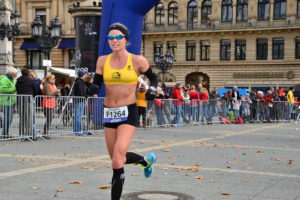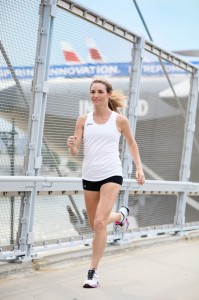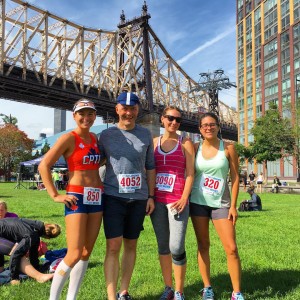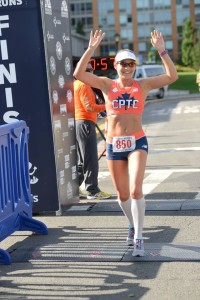 The off season. Most runners are really bad at this. It’s incredibly tempting to cross that goal finish line fired up and ready to dive into the next goal. Even if legs feel great within a day or two of that goal race, it’s important to relax and PAUSE. I completely understand that post-marathon high. I clearly remember days after my first marathon, signing up for two spring marathons with all the enthusiasm in the world. We feel invincible, fired up and inspired. PAUSE. Injury risk is incredibly high within the days/weeks following that goal marathon. Even if you FEEL good, trust that there are things that are broken down and rebuilding. Remember that just like the hard work and the taper, a reverse taper is necessary. The best marathoners in the world take an off season. None of us are the exception. How long or dramatic of an off season an athlete needs will vary. But when in doubt, be conservative.
The off season. Most runners are really bad at this. It’s incredibly tempting to cross that goal finish line fired up and ready to dive into the next goal. Even if legs feel great within a day or two of that goal race, it’s important to relax and PAUSE. I completely understand that post-marathon high. I clearly remember days after my first marathon, signing up for two spring marathons with all the enthusiasm in the world. We feel invincible, fired up and inspired. PAUSE. Injury risk is incredibly high within the days/weeks following that goal marathon. Even if you FEEL good, trust that there are things that are broken down and rebuilding. Remember that just like the hard work and the taper, a reverse taper is necessary. The best marathoners in the world take an off season. None of us are the exception. How long or dramatic of an off season an athlete needs will vary. But when in doubt, be conservative.
During your off season, use that post-run high to push you towards recovering and rehabbing any aches and pains. Spend the time to lay out your goals for the following 12 months in a realistic way. Honestly look back over your strengths, weaknesses, and what should perhaps be the focus of your future training. We all have natural talents that translate to running. We also will all have natural weaknesses. The more you know yourself, the better you can train in the future.
Looking towards 2018, I’d advise a few tips for planning:
- Be aware of any travel you have planned. Out of town weddings, vacations where training may be compromised, etc – honestly factor those things into your calendar for next year. For example, I try to plan vacations where training conditions aren’t completely compromised during marathon training. Certain climates and locations are more or less supportive of training. Can you have gym access? Factor that in now. Or plan that vacation to the islands or with day trips for AFTER that goal race and during your off season.
- Make sure you budget some recovery into your calendar. Runners want to do everything, and this can be dangerous. Do NOT plan races in back-to-back weekends. Pick and choose. Otherwise injury risk and burnout will at some point occur.
- Choose races you WANT to do! The options are overwhelming. Think about you and why you want to run a specific race. Is it a fast course? Ideal weather? Scenic? Bucket list destination race? Friends and family want you to do it with them? Do what’s important to YOU, but be realistic. For example, as great as NYC Marathon is, it’s rarely that PR course. So if you want to knock your marathon time down or fight for that BQ, there are FAR better options out there. But if you love that course, then compare previous accomplishments to that course and that course alone.
When you slowly exit your off season (coach is doing that this week after 3 weeks completely off from running – okay, I went for 2 very easy 4-milers in that time), build back carefully. For example, don’t dive into a track workout on your first run back. Ease into things with a week (or weeks!) of easy-effort running. Then you can begin to think about adding intensity. Your body won’t lose everything during the off season. It will bounce back quicker than you think. But stay patient and conservative. Think big picture. And finally, while easing back into those miles, focus on FUN! Embrace a little structure-free running.
 So you just ran your goal race for the season, and are riding a high and eagerly filling your calendar for next year. First, congrats! It’s an exciting feeling to finish your goal race – especially a marathon. It’s also common to set new goals, get excited for the future, and get back out on the road to get back to work!
So you just ran your goal race for the season, and are riding a high and eagerly filling your calendar for next year. First, congrats! It’s an exciting feeling to finish your goal race – especially a marathon. It’s also common to set new goals, get excited for the future, and get back out on the road to get back to work! It’s been a hot second since my last blog post. I feel like I blinked, and we went from the end of 2015 to Spring 2016. My apologies, fellow runners and devote readers! I promise my posts will be back on track. There have been some big changes here – both personal and professional. If you are a New Yorker, you know that moving is perhaps the worst thing ever. Well, I’m happy to say I have found an amazing apartment, but am now in the downsizing and packing process. I am reminded when stress strikes to take a deep breath and go for a run. I always feel better. So if you are dealing with life stress, remember that 30-60 minutes to go clock some miles will always do your body, brain and happiness some good.
It’s been a hot second since my last blog post. I feel like I blinked, and we went from the end of 2015 to Spring 2016. My apologies, fellow runners and devote readers! I promise my posts will be back on track. There have been some big changes here – both personal and professional. If you are a New Yorker, you know that moving is perhaps the worst thing ever. Well, I’m happy to say I have found an amazing apartment, but am now in the downsizing and packing process. I am reminded when stress strikes to take a deep breath and go for a run. I always feel better. So if you are dealing with life stress, remember that 30-60 minutes to go clock some miles will always do your body, brain and happiness some good.





